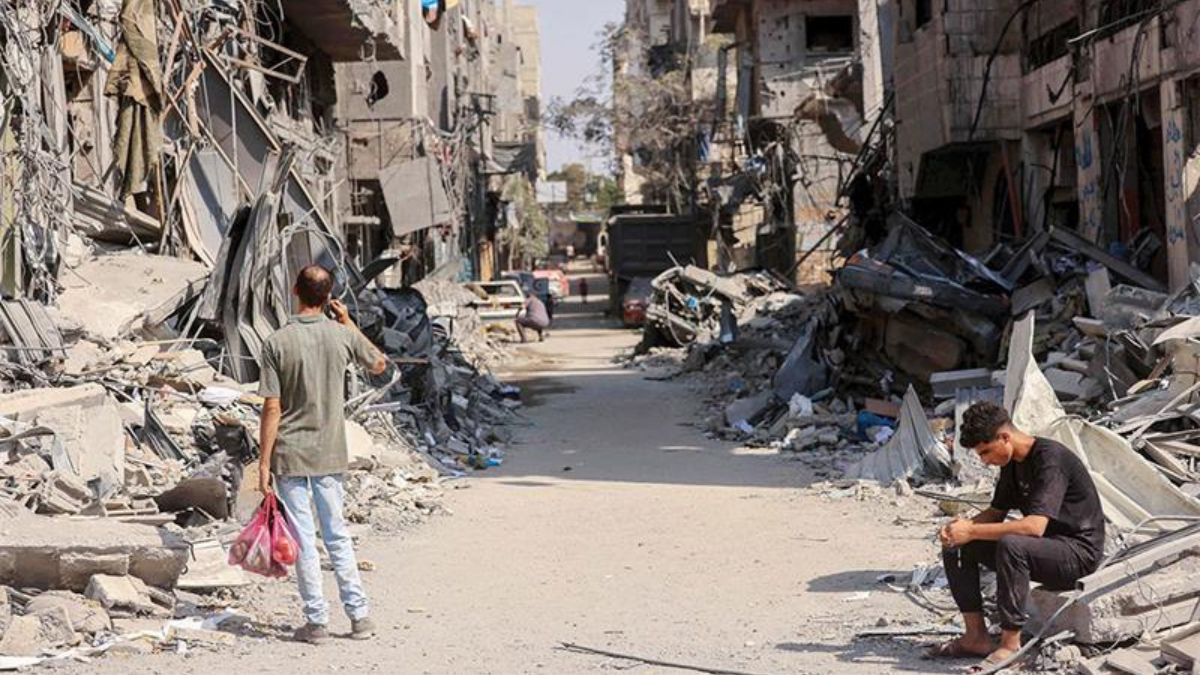Opinion
Mauritius: A Model for Palestine’s Fight for Resistance and Self-Determination

In an opinion piece published in Al Ahram, one the Arab world’s leading media outlet , Ayman Salama, a professor of international law, has argued that the Palestinian resistance movement has a legitimate right to self-determination and the right to resist aggression by any means, including the use of armed force.
Salama draws on international instruments, resolutions, and declarations to support this argument, including the International Court of Justice’s 2019 ruling on the right of self-determination in the case of Mauritius’ separation from the Chagos Archipelago.
Salama argues that the West’s support for Israel’s aggressive policies has enabled a rogue state to flout international law with impunity. It is suggested that Palestine could learn from the Mauritius example in its fight for self-determination.
NewsMoris hereunder republishes the article as it was published on October 26 in Al Ahram, before the ground incursion of the Israeli army into Gaza.
The Palestinian right to resist
By Ayman Salama
In the context of the ongoing armed conflict between Israel and the Palestinian group Hamas in the Gaza Strip, it is indispensable to highlight some basic legal issues.
Firstly, the Palestinian people have a natural right to self-defence. This right is not derived from any government or law but is inherent in all human beings.
Secondly, occupation is itself a form of aggression. If the Israeli occupation of the Occupied Palestinian Territories did not exist, we would not be witnessing the present cycle of violence.
Thirdly, the Palestinians have a right to resist aggression by any means. This right includes the use of armed force if necessary.
The right of the Palestinians to resort to armed resistance is not limited to conventional warfare enshrined in international humanitarian law such the Second Geneva Protocol, but also includes the use of guerrilla tactics and other forms of armed resistance in the struggle between the Palestinians and the longest military occupation in contemporary history.
There are a number of international instruments, resolutions, and declarations that support the right of a people under occupation to self-defence. These include UN General Assembly Resolution 3314 (1974) on the Definition of Aggression, UN General Assembly Resolution 3246 (1974) on the Protection of the Civilian Population Under Foreign Occupation, and UN General Assembly Resolution 2625 (1970) on the Declaration of Principles of International Law concerning Friendly Relations and Cooperation among States in accordance with the Charter of the United Nations.
They also include the First Protocol of the 1977 Geneva Conventions on International Armed Conflicts, the African Union Declaration on the Right of Peoples to Self-Determination, the Arab League Charter, and the Organisation of Islamic Cooperation Charter.
It should also be mentioned that the International Court of Justice (ICC) addressed this legitimate right in the context of the right to self-determination as a fundamental human right enshrined in international law. This is the right of a people to freely choose their political status and to pursue their economic, social, and cultural development.
The International Court of Justice (ICJ) has affirmed the right of self-determination in a number of cases, including the Legal Consequences of the Separation of the Chagos Archipelago from Mauritius in a case dating back to 1965 (2019).
In this case, the ICJ held that the right of self-determination is a legitimate right under international law and that it applies to all peoples, including those living in non-self-governing territories. The court further held that the UK had violated Mauritius’ right to self-determination by separating the Chagos Archipelago from Mauritius without the consent of the Mauritian people.
The ICJ’s decision in the Chagos case is significant because it reaffirms the importance of the right of self-determination and its applicability to all peoples, regardless of their political or economic status. It also sends a strong message to states that they must respect the right of the self-determination of peoples.
The ICJ stated that the right to self-determination “can be asserted by force only in very exceptional circumstances” in this case and further stated that the use of force to achieve self-determination must be “a last resort” and that it must be exercised in a manner that is consistent with other principles of international law, such as the prohibition of the use of force against civilians.
As to how the ICJ’s rulings on the recourse to armed force by an occupied people apply to Palestine, it should be stressed that the Palestinians have reached the end of their tether. They have signed many international agreements with Israel, and the Palestinian leadership has officially recognised the Israeli state.
At the Arab Summit in Beirut in 2002, the Arab states adopted the well-known Arab Initiative that aimed to reach a just and lasting peace with Israel. Unfortunately, Israel, with its characteristic arrogance, spurned the initiative just as it has reneged on its obligations under every agreement and initiative it has signed.
At the same time, no one can reasonably place the Palestinian resistance on a par with a state that possesses one of the largest arsenals of legitimate and internationally prohibited weapons which it has been using against the Palestinian people under occupation since 1967.
Nor can anyone who has been following the longest illegal military occupation in modern history compare the actions carried out by the Palestinian resistance, which the West so readily condemns in its unwavering one-sided support for the occupying power, with the severity and magnitude of the systemic injustices and flagrant human rights violations that have been the hallmark of Israel’s policy towards the West Bank and Gaza since it occupied them in June 1967.
It is obvious that when the US-led West describes the Palestinian resistance as “terrorist,” its aim is to deliberately overlook the crimes against humanity that the Israeli Military Occupation authorities are perpetrating against a defenceless civilian Palestinian population that has played no part in the rounds of hostilities between the Palestinian resistance and the Israeli army.
Indeed, Israel might not be perpetrating the ethnic cleansing and other crimes of war and crimes against humanity that we see today had the West not condoned the Israeli aggression against Palestine in 1967.
Under the rules of international responsibility, UN member states must not sanction international crimes committed by a member state or contribute in any way to the perpetration of such crimes whether through incitement, collusion, or aiding and abetting. Moreover, it is their responsibility to stop the perpetration of international crimes committed by a UN member state.
It is clear that liberation movements have a certain status under international law. They are not sovereign states, but they are entitled to certain rights and are subject to certain obligations.
For example, liberation movements are entitled to the right to self-determination. This means that they have the right to struggle for their independence and to establish their own government. Liberation movements are also entitled to the protection of human rights law. This means that their members and supporters are protected from human rights abuses, such as torture, arbitrary detention, and extrajudicial executions.
In addition, liberation movements are subject to the laws of war. This means that they must comply with certain rules when conducting armed conflict, such as the rules of distinction, proportionality, and necessity.
The status of liberation movements under international law is still evolving. However, it is clear that they have certain rights and are subject to certain obligations under international law.
The following are some examples of the legitimate exercise of the right of self-determination under international law: a non-self-governing territory becoming an independent state; a people within a state seeking and achieving greater autonomy or self-government; a people within a state seeking and achieving free association with another state; a people within a state seeking and achieving integration with another state.
The above-mentioned international instruments refute beyond any doubt the Israeli false labelling of the armed Palestinian resistant movement as terrorist.
In a sense, Israel had insistently and arrogantly deprived the Palestinians of their inherent and natural right of self-determination, which constitute a jus cogens and erga omens norm in international law, meaning that it precedes and has domain over other international law norms.
To conclude, the West must stop its blinkered approach to the conflict and adopt international law as its policy guidelines instead of the law of the jungle. It should reassess its strategies and positions that have been so flagrantly biased in favour of the country that has incurred the greatest number of UN resolutions condemning its violations of international law and human rights.
This record has been possible because the Western powers have enabled Israel to become a rogue state that flouts the principles, rules, and conventions of international law with impunity.
The original article can be viewed HERE.











